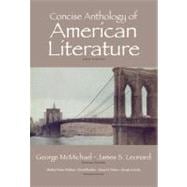This concise anthology offers a balanced approach to the enjoyment of reading American literature. Over 20 new authors representing diverse cultural backgrounds allow students to read about unique experiences through the eyes of esteemed writers including Sonia Sanchez, Sherman Alexie, Maxine Hong Kingston, and Frances E.W. Harper.
New historical documents, including the romantic letters exchanged by John and Abigail Adams and an account of the Vietnam War through the eyes of a young soldier, provide an understanding for student readers. Four groundbreaking dramas (from the 18th century: Slaves in Algiers, by Susanna Haswell Rowson; from the 19th century: The Escape, by William Wells Brown; from the early 20th century: Trifles, by Susan Glaspell; and from the late 20th century: Fences, by August Wilson) help students understand the role of theater in America through the centuries. Speeches by Legendary Leaders include Martin Luther King’s unforgettable “I Have a Dream” speech and Booker T. Washington’s historical Atlanta Exposition Address in addition to Barack Obama’s 2009 Inaugural Address.
What’s New in the Seventh Edition:
-Artworks and historical photos give greater meaning to historical events and selections, such as an artist’s rendition of the signing of the Declaration of Independence and a photo of Civil War devastation in Charleston, South Carolina.
-Twenty new authors, representing diverse cultural backgrounds, increase the number of contemporary authors which is always enjoyable reading.
-Eavesdrop into the romance of John and Abigail Adams by reading their romantic letters. Share the trauma of the Vietnam War through the eyes of a young soldier.
-Four groundbreaking plays will captivate you and help you understand the role of theater in America through the centuries.
-The speeches by legendary leaders, such as Martin Luther King and Booker T. Washington, and have stood the test of time and inspire us today. If you were wishing that you had a copy of President Barack Obama’s 2009 Inaugural Address, you’ll find it here.








